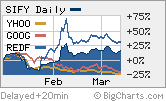|
Searching for India's Google and Yahoo!
Shares of Indian Net firms Rediff and Sify are on fire while the stocks of U.S. online companies struggle. Is it too late to jump in?
NEW YORK (CNNMoney.com) – Forget about Google, Yahoo! and eBay. Investors trying to find the next hot Internet stock aren't looking for companies based in Silicon Valley...or anywhere else in America for that matter. They're looking to India. While many large U.S. Internet stocks struggle this year, shares of Sify (Research), a Chennai-based Internet content and networking firm, are up nearly 20 percent so far in 2006. Shares of Rediff.com (Research), a Mumbai-based portal, have surged 35 percent. George Mihalos, an analyst with Gilford Securities, said that since India has only about 40 million Internet users among a total population of 1.1 billion people, it's easy to see why investors are excited, especially since Rediff and Sify are the only Indian Internet stocks that trade in the United States. Contrast that with China, another market that investors have been attracted to because of strong growth forecasts. There are several online and wireless content companies that trade in the United States, including Baidu (Research), Netease, Sohu, and Sina. "The opportunity in India is drawing parallels to the Chinese market. The Indian market is probably about five years behind China," said Mihalos. "But scarcity value is playing a role here. There are only two companies to buy." Todd Campbell, president of E.B. Capital Markets, an independent research firm catering to institutional investors, also thinks that Rediff and Sify are primed to benefit as more and more Indian people go online. "There is no doubt that there is a tremendous market developing in India because of this relatively explosive growth in their middle class," he said. But Mihalos said the companies have more than just potential. Fundamentals are already improving at a rapid rate. Rediff reported a full year profit in 2005, reversing a year-ago loss. Sales increased 48 percent. And although Sify lost money in its fiscal third quarter, which ended in December, sales grew by 27 percent from the same period last year and the company did report positive cash flow. Analysts expect Sify to post an annual profit for its next fiscal year, which ends in March 2007. Don't believe the takeover hype
However, investors will need to be cautious. Mihalos said merger rumors are another factor behind the meteoric rise in shares of Rediff and Sify, on the theory that U.S. Internet giants Google (Research) or Yahoo! (Research) might want to gain a stronger foothold in India. But Mihalos said there might not be a need for either of the U.S. search leaders to make such a deal. "We do not believe that either Rediff or Sify would be acquired imminently," he said. "Yahoo! already is in India and has a site that is very strong and Google is already one of the top search firms there." Campbell agrees that investors should not be betting on a buyout. "I'd be more interested in buying Rediff and Sify because of their tremendous growth rates," he said. With that in mind, Mihalos thinks that these stocks could pull back in the short-term. Since both stocks trade as American Depositary Receipts (ADRs) and volume tends to be light, it doesn't take a lot to move the shares in either direction. So if momentum investors that have bid up the shares on takeover chatter suddenly decide to bail, it could get ugly. Then there's the fact that Rediff and Sify are still relatively small companies in a market that most U.S. investors don't know a lot about. "Long-term there is a lot of upside but investors have to decide what they are willing to pay for these companies in the short-term," Mihalos said. "Whenever you're dealing with emerging companies in emerging markets, you have to be prepared for volatility. Investors have to have a strong stomach to get involved in these companies." Campbell also said that Rediff and Sify are good bets for the long-term but that he would not be surprised to see the shares bounce around a lot in the next few months. So he thinks that investors looking to cash in on India might be better off buying shares of communications equipment firms that will help build out the broadband networks to handle all the voice, video and data traffic in India. He specifically recommends networking giant Cisco Systems (Research) and smaller firms such as Tellabs, France's Alcatel and Israeli-based Orckit Communications. For more about Cisco's attempts to rediscover its "growthiness," click here. Does anyone out there believe in globalization? Click here.
Analysts quoted in this story do not own shares of the companies mentioned and their firms have no investment banking ties with the companies. |
|




